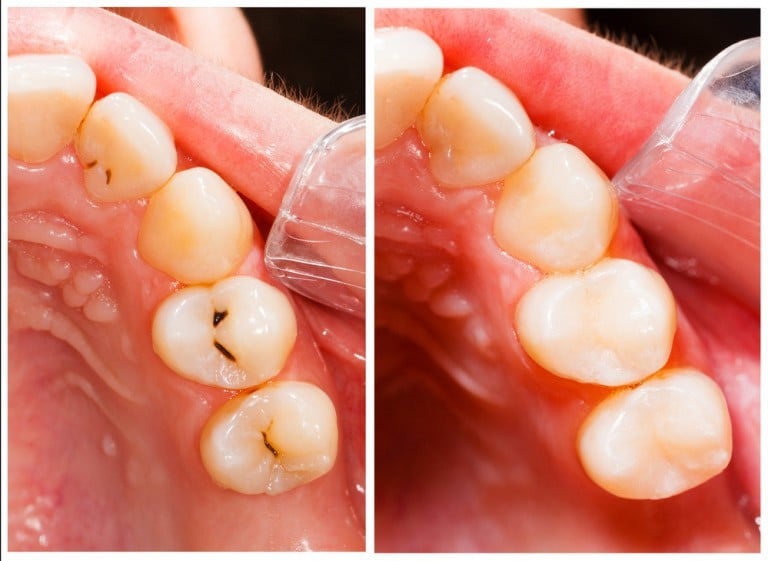
Composite Tooth-Colored Fillings in Las Cruces, NM
Composite fillings – also known as tooth-colored fillings – are dental restorations designed to be inconspicuous and natural in appearance. They blend well with the teeth and appear more natural than amalgam fillings, which are darker and more easily seen by other people.
Composite fillings are made of ceramic and plastic compounds that chemically bond to the teeth. They can be used to fill in decayed areas of the teeth, as well as to help repair chipped or broken teeth.
Most dentists use composite restorations to treat the teeth closest to the front of the mouth, as they are more noticeable when patients smile.
However, advancements in dental technology and the composition of composite fillings have made it possible for Auburn dentists to also use tooth-colored fillings on molars, which receive more wear than other teeth.
Did you know…
that composite fillings allow dentists to preserve more of the natural tooth structure? This is because composite materials chemically bond to the surface of the tooth like an adhesive. The process takes slightly longer to complete than traditional amalgam fillings, but patients can preserve more of the natural portion of the teeth while enjoying a restoration that is discreet and understated.
Frequently Asked Questions
Am I a candidate for tooth-colored fillings?
If you have a cavity, broken tooth, or a deteriorated filling, you may be a candidate for a tooth-colored filling. A filling is used to restore and protect a tooth from decay, cracks, or fractures.
Dr. Borham can examine your tooth to ensure you receive proper treatment. If you’d like to schedule a dental consultation to find out if composites are right for you, give us a call today (575) 523-5589.
What should I expect if my dentist decides a composite filling is right for me?
During your visit, your gums and teeth will be anesthetized with a local anesthetic near the site of the filling. Once the area is numb, the decayed or damaged portion of your teeth will be removed to make room for the new tooth-colored filling.
Then, resin will be placed over the area and cured with a hand-held light for less than a minute. The new filling will then be shaped and polished before the procedure is complete.
How long do composite fillings last?
Composite fillings are designed to last up to five years or more with good oral care. With a proper dental hygiene routine, your teeth will remain healthy and eliminate the risk of another decayed tooth.
When a composite filling needs to be replaced, it can be easily be done here at our Las Cruces dental office.
What type of post-treatment care is required after getting a composite filling?
Composite fillings are preserved with light at our dental office. You should be able to return to normal activity and oral care immediately after your visit.
It’s normal for treated teeth to experience some sensitivity to hot and cold in the days following treatment, but sensitivity that persists beyond a week should be reported to your dentist.

Dentures in Las Cruces, NM
Are you suffering from the effects of missing teeth? If you’re missing one or more teeth you may have noticed a decline in your appearance and overall health. If this is the case, we can help you achieve a beautiful, full smile with dentures.
Types of Dentures We Offer
Since each patient has different dental needs, we offer multiple different types of dentures. If you’re not sure which option is best for you, we’ll work with you to create a customized treatment plan for you.
Partial Dentures
If you’re missing one or multiple teeth, Dr. Borham may suggest partial dentures. This restoration consists of one or more dental crowns that are attached to your existing natural teeth. We’ll either attach it using metal framework, or by placing crowns over existing adjacent teeth to support the partial denture.
Full Dentures
Full dentures are a great option for those who are missing a full set of teeth. This restoration is custom fit to your mouth and secured firmly to your gums. You’ll start experiencing an improvement in your appearance and oral health after receiving this restoration option.
Both partial and full dentures are an affordable way to restore your smile, and often you can even receive these options in just one visit.
Implant Retained Dentures
If you’re looking for a more secure replacement option, talk to Dr. Borham about implant retained dentures. These removable dentures are secured to your mouth using dental implants.
First, the number of implants you need will be placed in your jawbone. Next, your removable dentures will be attached to the implants. With this option, you’ll notice your dentures fit better and are less likely to loosen over time.
Are You a Candidate for Dentures?
If you’re missing teeth for whatever reason, replacing them with dentures may be a beneficial solution. Dentures will boost your self-confidence and improve or create relationships as well.
You may also be a candidate for dentures if your teeth are severely decayed or damaged. Dr. Borham will securely attach your dentures in your mouth after extracting the damaged teeth, leaving you with an attractive smile you’ll be proud to show off.
If you’ve noticed a decline in your ability to eat your favorite foods or talk to others, dentures will improve these functions and alleviate the stress they may be causing.

Maintaining and Repairing Dentures
Since dentures are a replacement for your natural teeth, we recommend taking extra care of them, only consuming food or beverages that won’t damage them.
Cleaning your dentures regularly is also essential if you want your dentures to last for many years to come and avoid oral problems. Taking out your dentures and cleaning them with a toothbrush and toothpaste is the best way to ensure they don’t become stained or worn.
We’ll also provide a cleaning solution for you to soak your dentures in. Before you go to bed, simply take out your dentures and leave them in the solution overnight. This will ensure they’re disinfected and won’t damage your gums.
If your dentures break or become ill-fitting, contact us right away. Dr. Borham will inspect them and send them to a special lab to be fixed.
Denture Replacement
Dentures will enhance your smile, but some options might not be sufficient long term solutions for some patients. While implant-retained dentures may be beneficial for many people, others may prefer a more permanent option.
Dental implants are a permanent solution to missing teeth that are inserted directly to your jawbone to stimulate bone growth. They also provide you with more freedom and eliminate restrictions on what you can eat and drink. Dr. Borham can replace one, multiple, or even a full arch of teeth with natural-looking implants.
Frequently Asked Questions About Dentures
How much is a set of dentures?
The average cost of a set of dentures ranges from $600 to $2,000. The cost is determined on a case by case basis depending on your individual needs. For a more accurate estimate, contact our Basalt office at (970) 279-5647 to schedule a consultation.
Dr. Borham will examine your oral health, and provide you with a more precise, complete cost, based on your customized treatment plan. Insurance may cover a portion of the expense. We suggest contacting your provider prior to your consultation to get an understanding of your coverage.
We also offer financing options so you don’t have to go another day without a complete smile.
How can dental implants improve my experience with dentures?
Dental implants provide a secure base for dentures, making them more stable while performing daily functions. You’ll be able to speak and eat without worry that they’ll slip around in your mouth. You’ll also be free of any diet restrictions, so you can fully enjoy the benefits of your new smile. Ask Dr. Borham about our implant-retained dentures for more information.
How long do you have to wait to get dentures after teeth are pulled?
If you have tooth extractions, you’ll have to wait until the gums are healed which usually takes six to eight weeks. During that time, Dr. Borham can fit you for immediate dentures so you won’t have to miss a day without your smile.
My current pair of dentures are loose or ill-fitting, what are my options?
Over time dentures will become loose due to continuous wear. If you experience discomfort with your dentures, contact Dr. Borham immediately. He’ll have you come into his office so he can re-evaluate your restoration. If you prefer a more permanent solution than dentures, implants may be right for you. They are more stable and require the same maintenance as your natural teeth.
My dentures broke, how do I fix them?
Dentures are complex and should only be fixed by a professional. We recommend that you bring them into our office so we can send them to a special lab to repair them. Trying to fix them on your own could cause damage to your dentures, so be sure to contact our office immediately so we can help you repair your smile.
How do I clean my dentures? How do I remove staining?
To clean your dentures, you’ll remove your restorations and brush them with a soft-bristled toothbrush and toothpaste. You’ll also soak them in a special solution overnight to get rid of any bacteria.
To remove stains, you can either purchase a denture cleaner made to remove stains or bring them into our office to have them cleaned professionally.
Receive A Complete Smile in Las Cruces, NM
Are you ready to restore your smile and improve your appearance as well as daily functions? Dentures are natural-looking restorations that will provide you with a full smile. Contact us at 575-523-5589 to get started on your journey to a new smile.
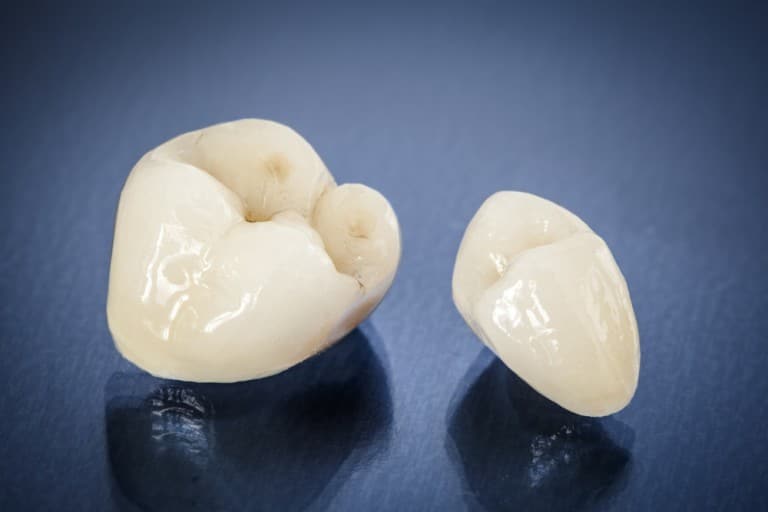
Provisional Restorations in Las Cruces, NM
Provisional restorations are often used during complex restorative dental procedures to serve as temporary prosthetic replacements while patients wait for a permanent restoration. Provisional restorations offer patients to try-out the look and feel of the final prosthetic and make any necessary changes before the final fabrication and fitting.
Unlike temporary prosthetics of the past, modern provisional restorations are highly functional and aesthetically pleasing. Today’s temporaries are composed of a quality acrylic resin that mimics the look and feel of permanent metal or ceramic restorations.
Did you know…
Provisional restorations are a primary component of smile reconstructions. In addition to serving cosmetic purposes for patients with missing or damaged teeth, dental temporaries provide the following functions:
- Reserving’ space for the permanent restoration by preventing surrounding tooth movement
- Protecting reduced natural teeth that are prepped for restorations
- Preserving the health and natural contours of the gums surrounding the restoration
- Protecting exposed dentin from bacteria and plaque
- Preventing tooth sensitivite
- Facilitating normal eating and speaking
Frequently Asked Questions
Will I need a provisional restoration during the course of my dental treatment?
You may need a provisional restoration if you are preparing to get a new crown, bridge, veneers, dental implants, or some other permanent restoration. Temporaries may be put in place to ensure you are pleased with the aesthetics and fit of your new prosthetic.
You may also be fit for a provisional restoration while you wait for a dental lab to finalize your permanent ones.
What should I expect when being fit for a dental temporary?
Temporaries are constructed in a dental laboratory using impressions and digital images of your teeth. The lab will produce a ‘wax-up’ that you will approve before the temporaries are fabricated.
Dr. Borham or Dr. Oushy will prepare your teeth for the provisional restorations and temporarily attach them to your teeth, where they will remain until you are ready for your permanent restorations.
How long do I need to wear a provisional restoration?
You may need to wear your temporaries for just a few days or for several months depending on the type of dental reconstruction you are undergoing.
Temporaries formed in place of crowns or veneers may only need to be worn for a few days to a few weeks. Dental implant and full-mouth reconstruction patients will need to wear provisional restorations for several months while the gums heal and the implants fuse with the surrounding bone.
Will I need to follow any special guidelines after receiving my temporary restoration?
It’s important to keep in mind that provisional restorations are less durable than permanent ones and are placed using provisional cement. It is possible for them to shift or become damaged, so you should be careful and follow our guidelines for caring for your temporaries.
This includes following a good oral hygiene routine, abiding by dietary restrictions, and using protective mouth gear during sports or high impact activity.
Tooth Extractions in Las Cruces, NM
Tooth extractions are routine dental procedures used to remove decayed, damaged or otherwise problematic teeth. Dentists usually make every effort to preserve natural teeth, although sometimes an extraction is necessary. Although the procedure is performed in a dentist’s or oral surgeon’s office, it is considered surgery. Depending on which teeth are removed, they may be replaced with a dental implant or another oral prosthetic.
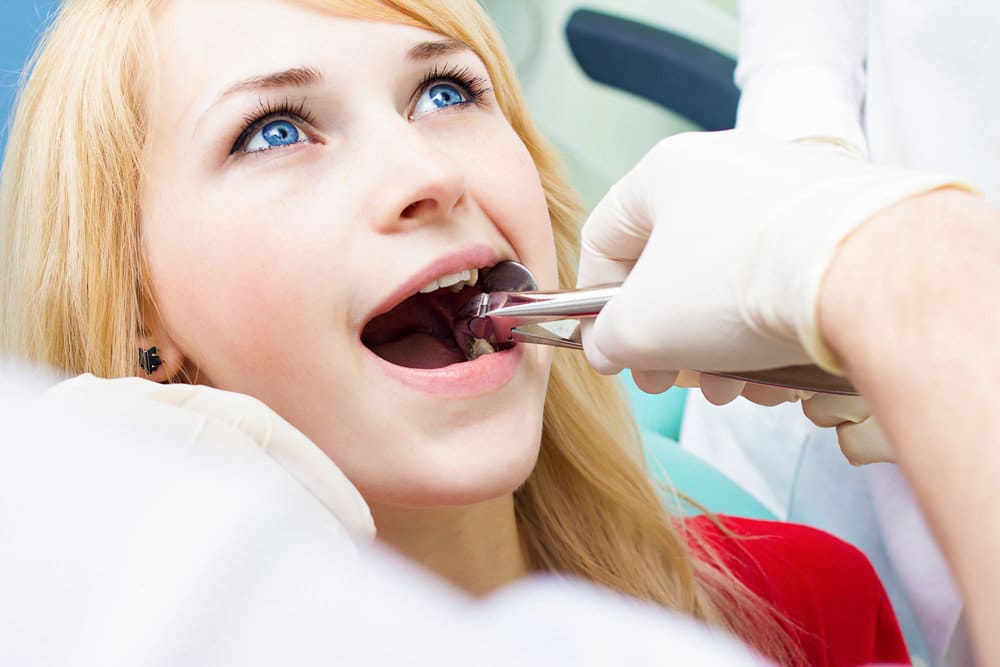
There are several reasons why you could need a tooth extraction.
The most common cause of tooth extractions is severe tooth decay and cavities. However, many patients also undergo extractions for impacted teeth – particularly wisdom teeth. Other causes for extraction include advanced periodontal disease, cracked teeth, and teeth that are severely malformed. Although many circumstances that require extraction are unavoidable, some could be prevented with regular visits to the dentist for exams and cleanings.
Frequently Asked Questions
Do I need a tooth extraction?
Only your dentist can tell you if you need a tooth extraction. However, you may be a candidate for the procedure if one or more of your teeth are decayed so severely that a filling or other restoration is not a possibility for treatment.
If you think you need a tooth extraction, it’s best to schedule a consultation at our Las Cruces office by calling (575) 523-5589. Dr. Borham will examine your oral health and provide you with a customized treatment plan based on your needs.
What should I expect during my tooth extraction appointment?
If you and your dentist decide to extract one or more teeth, you will be scheduled to return for oral surgery at a later date. You will be given a local anesthetic to prevent pain during the procedure, and you may be prescribed medications to help manage pain in the hours following your extraction. Depending on the nature of your extraction and other factors, such as whether your teeth are impacted, you may also be sedated or given general anesthesia during your procedure.
What type of post-treatment care will I need to follow?
Post-operative care following a tooth extraction is essential for healing and preventing complications. You will be instructed to avoid certain foods and also keep the surgical site clean at all times. If you are prescribed an antibiotic, it is important that you complete the course of treatment to prevent infection. Finally, you may be advised to avoid smoking or drinking through a straw, as doing so may delay the healing process and cause a condition known as ‘dry socket.’
What types of foods should I eat following a tooth extraction?
For the first 24 hours, you should stick to soft, cool foods such as Jello-o, pudding, and ice cream. After the initial 24 hours, you can add lukewarm foods such as mashed potatoes, scrambled eggs, and broth-based soups.
Only chew on the opposite side of the mouth from the treated area until the healing process is complete. As your mouth tolerates more solid foods, you can introduce them to your diet.
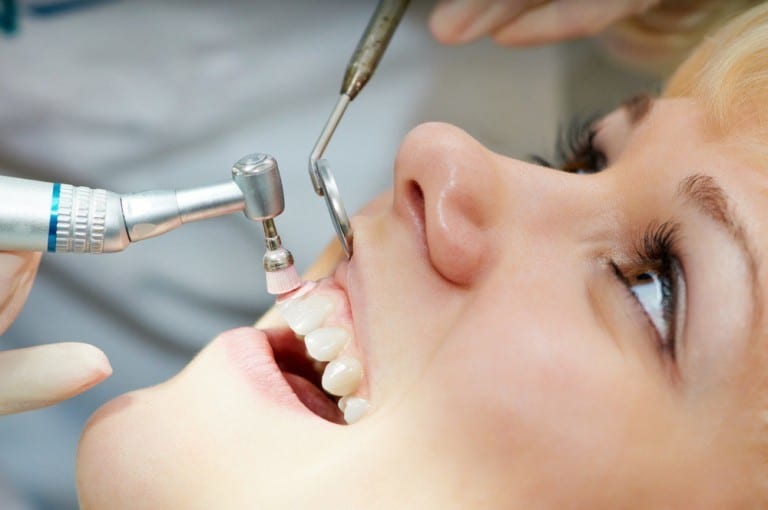
Dental Cleanings in Las Cruces, NM
Preventative care is a foundation of dentistry. The American Dental Association recommends visiting your dentist regularly – usually about twice yearly – for full cleanings, examinations, and consultations for potential treatment. Professional dental cleanings help remove built-up plaque that is not removable using conventional brushing and flossing. Often, dentists are also capable of identifying potential problems that patients are not yet able to see or feel. When you maintain regular preventative dental appointments, you can stave off decay and gum disease, as well as identify the beginnings of oral health problems before they become severe.

Did you know…
that Americans are less and less likely to visit the dentist as they age? Data from the Centers for Disease Control reports that only 57 percent of Americans over age 65 visited the dentist in 2010. That compares to about 61 percent adults under age 65 and about 79 percent of children ages 2 to 17. Nonetheless, it is important to visit the dentist for cleanings and exams regardless of how long has passed since your most recent dental appointment.
Frequently Asked Questions
Do I really need to have my teeth professionally cleaned?
Yes, you need to have your teeth cleaned regularly by a dental professional if you want your smile to stay healthy and beautiful. Even if you clean your teeth every day, there are areas of your mouth that can be difficult to reach consistently.
We can clean your teeth thoroughly, including those difficult areas as well as any hardened plaque, called tartar or calculus, that’s built up. Along with cleaning your teeth, we’ll check to make sure you don’t have any cavities or oral health concerns.
Preventing oral diseases is the best course of action, but detecting them before they become series is the second-best situation. If you’re coming in regularly for your appointments, you won’t have to worry about your oral health getting out of hand.
What should I expect at my cleaning and exam consultation?
At your appointment, your teeth will be thoroughly cleaned by a hygienist and examined by your dentist. Your teeth will also be polished for extra shine.
If you haven’t been to our office for a while or haven’t had X-rays recently, we may take some as part of your examination. X-rays allow us to see areas of decay and issues that aren’t visible to the eyes.
In the case that your dentist or hygienist detects any potential problems, they’ll recommend treatments.
What types of guidelines should I follow after my visit?
Between dental cleanings, make sure to take care of your teeth every day. This includes brushing your teeth twice a day with a soft-bristled toothbrush, toothpaste, and flossing at least once a day.
Fluoride and antibacterial mouthwashes can also help protect your teeth. Fluoride helps to prevent cavities and can be found in mouthwashes and some cities have it in tap water to promote dental health. Antibacterial mouthwashes can help remove bacteria from your mouth and prevent periodontal disease.
If your teeth and mouth require any special care, your dentist will let you know and work with you to develop an oral hygiene routine that works for you.
Teeth Whitening Treatments in Las Cruces
Teeth whitening procedures are used to brighten the appearance of a patient’s smile – sometimes by as many as 5 to 10 shades in a single session. According to the American Dental Association, teeth whitening procedures have become some of the most popular esthetic dental treatments among patients throughout the country, including. Professional teeth whitening services can be performed in an office setting or prescribed for take-home use by a patient. In comparison to over-the-counter teeth whitening treatments, professional whitening uses stronger whitening agents that deliver faster and more effective results.
Did you know…
that the teeth naturally darken as we age? Furthermore, certain foods, beverages, medications and habits can contribute to a darker, yellowed, or stained smile. However, it is possible to erase years of stains in a single professional whitening session and sustain those results for many years with proper maintenance. According to the American Academy of Cosmetic Dentistry, professional whitening is best maintained by a combination of good oral care and take-home whitening treatments as recommended by your dentist.
Frequently Asked Questions
What can I do about stained or discolored teeth?
Professional teeth whitening (or bleaching) is a simple, non-invasive dental treatment used to change the color of natural tooth enamel, and is an ideal way to enhance the beauty of your smile. Over-the-counter products are also available, but they are much less effective than professional treatments and may not be approved by the American Dental Association (ADA).
Depending on your needs, you can choose between in-office and at-home teeth whitening:
Home teeth whitening systems: At-home products usually come as a gel that’s placed in a custom-fitted mouthguard (tray) created from a mold of your teeth. The trays are worn either twice a day for approximately 30 minutes, or overnight while you sleep. It usually takes several weeks to achieve the desired results depending on the degree of staining and the desired level of whitening.
In-office teeth whitening: This treatment is done in the dental office and provides immediate results. It may require more than one visit, with each visit lasting 30 to 60 minutes. While your gums are protected, a bleaching solution is applied to the teeth.
Am I a candidate for teeth whitening?
You may be a candidate for professional teeth whitening if you are experiencing discoloration, but otherwise have healthy teeth and gums. Schedule a consultation with Dr. Borham to find out if teeth whitening could be right for you. Some patients, such as those who are pregnant or sensitive to whitening agents, may not be candidates for professional whitening.
What should I expect when I get my teeth whitened?
Teeth whitening consists of a thorough cleaning and polishing of the teeth, with all debris carefully removed. Dr. Borham will protect your gums before applying a whitening agent to the surface of your teeth. The product will be activated and left on your teeth for several minutes before being washed off with water. Your results will vary according to the natural shade of your teeth and degree of discoloration, but it’s normal for patients to brighten their teeth by several shades in a single visit.
What type of post-treatment care is required after having my teeth whitened?
It’s normal to experience some tooth sensitivity following a professional whitening treatment. You may be instructed to avoid consuming highly pigmented beverages for at least 24 hours to prevent your teeth from becoming stained again. Examples of drinks to avoid include tea, coffee, soda, and red wine. Depending on your results and long-term teeth whitening goals, you may also be sent home from your procedure with an at-home whitening kit for later use.
Dental Veneers in Las Cruces, NM
Do you hide your smile due to the chips, gaps, and stains in your teeth? When we smile, we increase happiness in ourselves and others around us, which is why Dr. Borham wants to help you achieve your dream smile.
Dental veneers are used to improve the cosmetic appearance of one or more teeth. They’re thin porcelain shells made to match the exact shape and color of your natural teeth. We can also bond whiter porcelain shells to your teeth as a substitute for traditional whitening services.
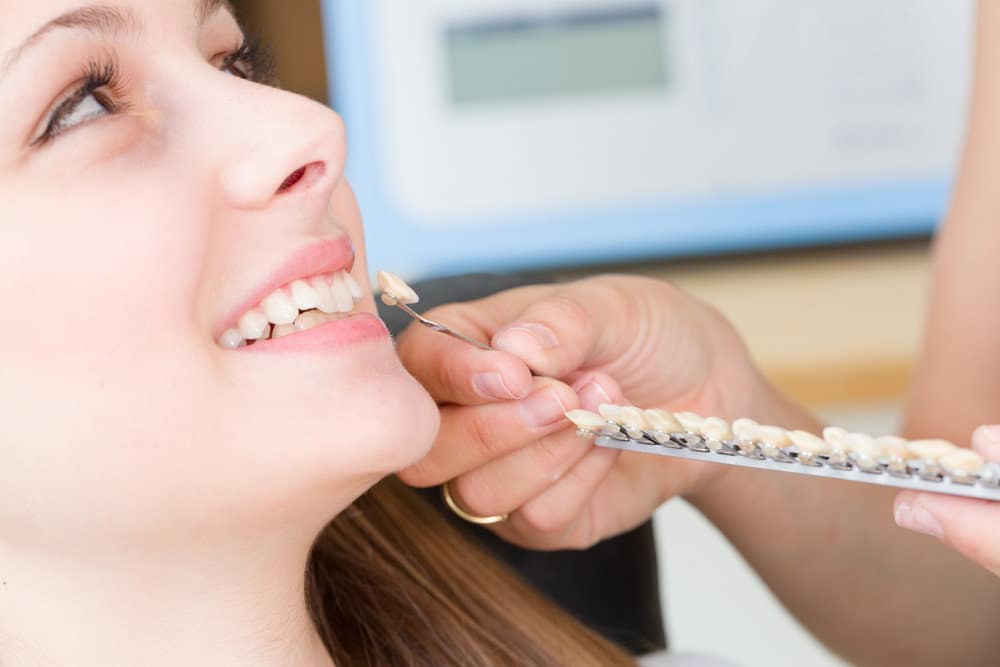
Am I a Candidate for Dental Veneers?
Dental veneers are a natural-looking way to eliminate imperfections in your smile. They blend in with your teeth so well that even celebrities such as Miley Cyrus and Ben Affleck have received this cosmetic solution to improve their smiles. However, you don’t have to be a celebrity to enjoy the benefits of veneers. They’re an affordable cosmetic option available to all our patients, especially with our convenient financing options.
Veneers may be the right solution for you if your teeth are cracked, chipped, uneven, gapped, or discolored.
The Dental Veneer Process
Choosing the right shape and shade of your new veneers is a crucial part of the process. Before you receive your veneers. Dr. Borham will use digital images and color matching tools to ensure you’re satisfied with your results.
During your procedure, your teeth will be prepped by Dr. Borham to make sure the veneers blend in seamlessly with the rest of your teeth. Since the veneer is about a half-millimeter thick, a small amount of tooth enamel must be removed so the veneer doesn’t stick out beyond your other teeth.
After your tooth is prepped, your veneer will be bonded to your existing tooth using dental cement. Once any extra cement has been removed and your teeth have been polished, you’ll leave your appointment with a beautiful, new smile.
Pros and Cons of Dental Veneers
Dental veneers can positively affect your life by giving you a smile that you’ll want to show to the world. Providing you with a healthy, appealing smile is one of our main goals at Mesilla Valley Family Dentistry and we want you to feel 100% comfortable with the services you choose. Here, we explain the pros and cons of veneers so you can decide if they’re right for you.
Pros
Veneers are long-lasting cosmetic solutions that will transform your smile. Their natural look makes it impossible for other people to tell that you’ve had dental work performed on your teeth.
Many of our patients rave about their newfound confidence after receiving the service and found that they’re more comfortable laughing and talking with others.
With dental veneers, you can receive a beautiful smile, and the process only takes a total of two appointments to complete.


Cons
While veneers last a long time, they don’t last forever. On average, they last about 15 to 20 years. However, if you do experience problems with your veneers, don’t hesitate to call and schedule a touch-up.
Veneers are less expensive than other services such as dental implants but can be more expensive than other cosmetic treatments. We do, however, work with many insurance providers and provide financing options to reduce the cost.
Frequently Asked Questions
What are porcelain veneers and how can they improve my smile?
Porcelain veneers are thin shells of tooth-shaped porcelain that are individually crafted to cover the front surfaces of your teeth. They’re very durable and won’t stain, making them a popular solution for those seeking to restore or enhance the beauty of their smile.
Veneers may be used to restore or correct the following dental conditions:
- Severely discolored or stained teeth
- Unwanted or uneven spaces
- Worn or chipped teeth
- Slight tooth crowding
- Misshapen teeth
- Teeth that are too small or large
Getting veneers usually requires two visits. They’re created from an impression (mold) of your teeth that is then sent to a professional dental laboratory where each veneer is custom-made to match the shape and color of your individual teeth.
Veneers are an excellent dental treatment that can dramatically improve your teeth and give you a natural, beautiful smile.
Is getting veneers painful?
No — Dr. Borham will apply a local anesthetic to numb your teeth and gums before the procedure, so you won’t feel any pain. You may experience some mild discomfort after your treatment, but this will should fade quickly. We also offer sedation options for patients who suffer from dental anxiety.
How long do veneers last?
Veneers can last seven to fifteen years, with proper care. Make sure to brush your teeth and floss every day, in addition to visiting your dentist at least twice a year. To help your veneers last, it’s also a good idea to avoid habits such as biting your fingernails or chewing ice cubes.
What if my veneer falls off or gets damaged?
If your veneer falls out or suffers any type of damage, don’t attempt to fix the issue on your own. Instead, call Dr. Borham right away and do your best to keep the veneer clean until he can see you.
Schedule Your Initial Consultation Today
If you’re ready to obtain a beautiful smile that will make you want to smile more, contact our office in Las Cruces, NM. Dr. Borham will evaluate your teeth and match them with a stunning set of veneers.

TMJ Treatment in Las Cruces, NM
TMJ refers to the temporomandibular joint, which is the bone structure, muscles and connective tissues that surround the jaw and control chewing. When patients experience disorders of this joint, they are said to have a temporomandibular joint disorder or TMD. Symptoms of TMD include pain and tenderness near the jaw, as well as popping or clicking in the joint when speaking or chewing.
There are many ways of treating TMJ disorders, ranging from non-invasive therapy and bite splints to injections or surgery. Left untreated, however, TMJ disorders can lead to headaches, muscle pain, malocclusion and tooth damage from grinding or clenching.
Did you know…
that TMD alone is not a disorder, but instead a collection of disorders that affect the temporomandibular joint? It is the second most common pain-causing musculoskeletal condition in the U.S. according to the U.S. National Institute of Dental and Craniofacial Research, as many as 12 percent of Americans may suffer from some type of TMD, with women twice as likely to be affected than men. But despite the prevalence and wide availability of treatment, only one out every three people with TMD fails to seek treatment.
Frequently Asked Questions
What should I expect if I undergo treatment for TMJ disorder?
TMJ disorder treatment varies from patient to patient, so it’s likely your experience may be different when compared to someone else’s. Dr. Borham may require you to adopt certain lifestyle changes to help facilitate rehabilitation in your jaw.
In some cases, you may be asked to avoid sudden jaw movements, such as yelling or yawning. Positional therapy, or sleeping on your back, can also be a preventive step to help reduce stress levels. If you’re experiencing symptoms related to TMJ disorder, schedule a consultation with Dr. Borham by calling (575) 523-5589. During the consultation, he’ll evaluate your symptoms and provide you with a customized treatment plan.
How do I know if TMD treatment is right for me?
If you’re experiencing pain associated with TMJ disorder, Dr. Borham will evaluate the extent of the condition and determine what course of treatment is best for you. Typically, the initial treatment for TMD involves conservative treatments, or a non-surgical procedure, and bite guards.
Medications may also be used to relax the jaw or relieve pain. Patients who do not respond to conservative treatments may be considered for surgery or joint injections.
Can TMJ disorder go away on its own?
Certain lifestyle changes may decrease the effects of TMJ, however, for long-lasting results, it’s best coupled with other interventions such as a bite guard or physical therapy. During your initial consultation, Dr. Borham will examine your oral health and determine the best course of action based on your needs.
What causes TMJ disorder?
There are many known causes of TMJ disorder, also referred to as TMD. Some of the possible causes include physical injury, misalignment of the teeth or jaw, stress, arthritis, clenching or grinding of the teeth during sleep, dental surgeries, poor posture, and infections.
What if I don’t seek treatment for TMD?
If left untreated, TMJ can have serious consequences that may have otherwise been avoided. You may experience joint damage and inflammation, wearing down your teeth, ear ringing, and hearing damage or loss. If you’re experiencing TMJ disorder, it’s best to put the painful symptoms to rest before they have lasting effects.
Contact our Las Cruces location by calling (575) 523-5589. One of our knowledgeable team members will be happy to answer any questions you may have.
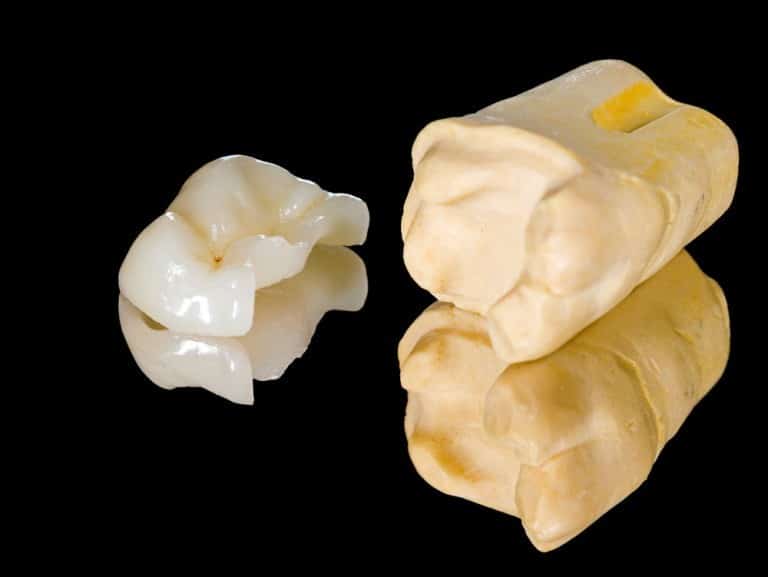
Dental Restorations: Inlays & Onlays in Las Cruces, NM
Inlays and onlays are dental restorations that are more extensive than dental fillings but less so than caps and crowns. They are typically formed in a dental lab and are made of gold, porcelain or resin depending on the patient’s needs and aesthetic goals. An inlay refers to a restoration that is formed to fit the center of a tooth, whereas an onlay refers to a restoration that encompasses at least, one cusp of the tooth. Both inlays and onlays are bonded to the surface of damaged teeth and matched to the color of the surrounding teeth.
Did you know…
that inlays and onlays can serve as alternative treatments to dental crowns when you have a broken or damaged tooth? When fillings are not enough to adequately repair a tooth, an inlay or onlay can be custom-created to fit securely onto the tooth’s surface. Depending on the materials used, the restoration can be created to appear natural and will have the same function of an organic tooth. Inlays and onlays have extremely high success rates and because they are custom made for each patient, most last longer than traditional fillings.
Frequently Asked Questions
Am I a candidate for an inlay or onlay?
You could be a candidate for an inlay or onlay in if you have moderate tooth damage or decay and are in search of an alternative restoration option to a crown or cap. Inlays and onlays are meant to look like part of your natural tooth, so they’re less noticeable than amalgam fillings.
If you’re a candidate for a dental filling, you’re likely also a candidate for an inlay or onlay. They’re not suitable for every type of tooth damage, such as cases where most of your natural tooth is missing, so your dentist will perform an examination to determine if an inlay or onlay is the best solution for you.
What should I expect when I get my inlay or onlay restoration?
Your inlay or onlay restoration will be completed over two dental appointments. First, your tooth will be prepared for treatment, and an impression will be taken to serve as a mold for your new restoration.
You may receive a temporary restoration to keep your tooth safe while your permanent restoration is created.
Once completed, you’ll return to have the temporary restoration removed and the permanent one bonded to the surface of the teeth. This doesn’t take long and you’ll soon be able to smile knowing your restoration looks completely natural.
Do I need to follow any post-treatment care guidelines?
Special care needs to be given to your teeth while temporary restorations are in place. It’s important to avoid sticky or hard foods that could cause significant damage to temporaries. Your dentist will give you detailed care instructions to follow.
Once you receive your permanent inlay or onlay, you can resume normal eating, brushing and flossing habits. It’s important to keep up with regular oral hygiene practices to keep your teeth safe and help your restoration to last as long as possible. Regular dental visits also ensure your restoration remains clean and healthy along with the rest of your smile.

If you are undergoing a dental procedure or operation, you will be given a set of post-operative instructions to abide by in the hours, days, and weeks after your treatment. Following these instructions is essential to preventing infections in surgical sites, protecting restorations, and minimizing the possibility of experiencing complications. Post-operative instructions vary from procedure to procedure, but you are still sure to have some questions regarding care. Your [city] dentist will be available to answer those questions and respond to any concerns you may have.

Try to anticipate some of the questions you may have about your post-operative care and ask them prior to your treatment.
Some of the most common post-op questions include:
-
How should I manage pain following my procedure?
-
How long should I experience discomfort?
-
Do I need to follow any special dietary guidelines?
-
Is it safe for me to drink through a straw?
-
Will I be able to drive myself home after my procedure?
-
Will I need to take an antibiotic?
-
Will I need to return to your office for a follow-up appointment?
-
When will my permanent restorations be ready?
-
How do I care for my removable prosthesis?
Frequently Asked Questions
Should I talk with my dentist about the questions I have regarding my post-operative care?
Yes. Your post-operative care is contingent on you understanding everything about the recovery process and your responsibilities in caring for your surgical site.
What should I expect when I speak with my dentist?
Your dentist should allocate enough time in your consultation and pre-operative exam to listen to your concerns and answer any questions you may have. You should also be provided a phone number that you can call following your procedure to discuss any questions that may come up at that time.
Is there anything I can do to make the process easier?
Yes. Begin thinking of any questions you may have about your post-operative care, and begin writing them down. You’ll be ready to ask all of your questions when the opportunity arises without missing any important details.